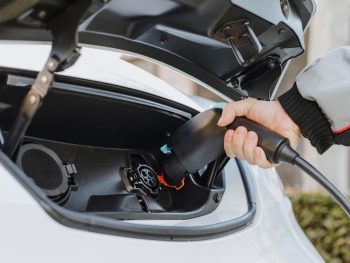The Government’s newly announced ZEV mandate could create considerable operational issues for fleets by putting EV supply before demand – potentially tipping into an oversupply of electric vans, says FleetCheck.

Now out for consultation, the mandate will require car and van makers to have a minimum percentage of new vehicle sales as zero emission to help drive net zero goals through increased electric vehicle take-up.
The proposals set out a sliding scale of EV production that gets underway in 2024 with 22% of car sales and 10% of van sales being zero-emission, rising to 80% and 70% respectively in 2030.
But Peter Golding, managing director at software specialist FleetCheck, said the Government was proposing to effectively force fleets to adapt their operations according to the speed at which ministers think electrification should be happening.
“This will not necessarily fit with the strategies that fleets have already created for the adoption of EVs over the next few years and will force many into re-evaluating their plans.
“The fact is that many fleets have substantial operational issues to overcome on the road to electrification, especially when it comes to vans, and artificially limiting supply of ICE vehicles while pushing EV production higher won’t do anything to solve these.”
Golding added that while meeting car targets was almost certainly not a problem, vans could prove an issue.
“The jury is out when it comes to whether demand means one in 10 van sales is electric in 2024. We could easily tip into electric van oversupply.”
Latest SMMT data on LCV registrations shows battery electric vans (BEVs) accounted for one in 20 or 5.3% of the market in March and 5.1% for the first quarter of 2023 – showing that take-up will need to double next year.
Avoiding supply and demand mismatches will require the Government to ramp up work on both incentives and infrastructure investment, said Golding.
“Significant efforts will be needed to persuade fleets into electric vans at the kind of pace that is being envisaged. That means not just further upfront grants and other measures in both the new and used sector but massive resources being put into kerbside charging, which is essentially non-existent in large areas of the country at the moment. Some more money has been made available but there is a general sense that charging remains a very real problem.”
The Association of Fleet Professionals (AFP) has warned that charging infrastructure is often unsuitable for vans, following reports from its members, and that lack of kerbside charging is also a big stumbling block for van operators looking to go electric. Its data indicates around 60-70% of fleet van drivers need kerbside charging installed in order to use an electric van – higher than the c.40% of car drivers.
FleetCheck’s Peter Golding finished: “Of course, the ZEV mandate is out for consultation and could well be changed but, as it stands, it presents fleets with many more questions than answers.”
- The ZEV mandate consultation is open until 11:45pm on 24 May 2023. To have your say, click here.

